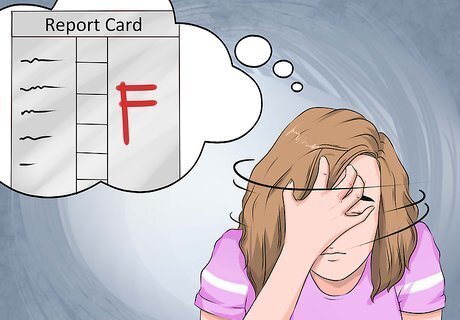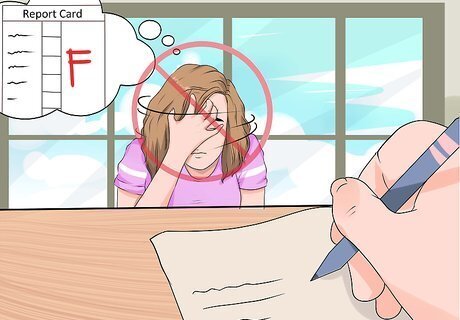
views
Feeling Good About Yourself

Write down your strengths, achievements, and the things you love about yourself. Grab a pen and paper and start making three detailed lists about yourself. Make one list each for your strengths, achievements, and things that you value about yourself. This will help you focus on the positive aspects about yourself. You can also read the lists anytime for a quick self-esteem boost. Have a friend or family member help you. Read over your lists regularly to help remind you of how important you are.

Take good care of yourself. Remind yourself that you are valued and important by taking excellent care of yourself. Caring for your health and personal needs can help you to have a healthy amount of self-esteem and self-worth. Get enough sleep at night. Eat a healthy diet, getting plenty of fruits and vegetables while avoiding foods with high levels of fat and sugar. Exercise regularly to help you feel your best and stay strong and healthy.

Do something you enjoy doing. At least once a day, set aside time for an activity that you love doing. Whatever that activity may be, you can show yourself that you are important and deserve the freedom to do what interests you.

Set new goals and challenges. Select a new hobby or activity that has always interested you and start doing it. Set goals to improve your skills in this new hobby and start working to meet them. This will allow you to remind yourself that you are capable and confident when meeting a challenge. Try learning how to play a musical instrument. Learn a new language that you find interesting. Try taking up a new sport or exercise program.

Spend time with people who make you feel good about yourself. A large part of our self-esteem comes from the people we surround ourselves with. Being around negative or critical people can cause self-doubt to arise. However, surrounding yourself with positive and energizing people can help make you feel important and valued.

Think about what makes you grateful. Gratefulness can remind you of what is important to you, your life, and the people who matter to you. Think about all of the people, whether it's friends or family, who hold you in high regard. Remembering gratefulness can help you remember that you are important.

Learn to feel important to yourself. Work on building your self-esteem enough to realize how much you matter. Try doing a self-assessment of your talents. Write all the things you are good at, and how you use that talent in your daily life. For example, maybe you are a good listener, and you use that skill to be a good friend and to help people at work resolve company issues. Write down how you can use your skills to follow your dreams. For example, maybe you always dreamed of helping people and making a real contribution to their lives. You can use this skill to go to school to become a psychologist. This will make use of your natural talents of listening to people and your passion to help people.
Replacing Negative Thinking with Positive Thinking

Think of a stressful or difficult situation. Examine your life and consider a situation that is troublesome. This issue will be used as a tool, that will allow you to discover how you approach it, how you view yourself, and enable you to make changes for the better. An example of this situation may be an argument, a big presentation, or a major life change.

Pay attention to your thoughts and beliefs. When thinking of the stressful or troubling situation you have selected, pay careful attention to your thoughts as you do. Knowing how you think and feel will allow you to later evaluate those tendencies and make any changes you would like. You may find your thoughts are rational, being based in facts and logic. Your thoughts might also be irrational or based on inaccurate information. Your thoughts may be positive, negative or neutral. For now, select the negative thoughts to work with.

Look for negative thoughts. As you examine your thoughts, pay attention to any negative ones or other thoughts that may be based on misunderstandings or inaccurate information. Try to understand that these thoughts might not be the only way to view your situation. Look for some of the following examples of negative thinking about yourself: Equating feelings with facts. You may get a feeling that someone doesn't like you, but the fact is, you don't know what that person is really thinking. Ending with negative conclusions, despite not having an reason or evidence to do so. Maybe you assume your boss will turn you down for a promotion even though you've never been turned down in the past. Only focusing on the negative. After a performance evaluation, you might dwell on the one critical comment and forget about the positive feedback you received. Talking to or about yourself negatively. You might tell yourself that you messed up after having a stressful conversation with someone. Turning positive thoughts into negative ones, degrading your successes or accomplishments. Perhaps you tend to be self-deprecating, even when you have reason to celebrate an achievement.

Replace negative thoughts with positive approaches. Once you have successfully identified some negative or inaccurate thoughts you may have, you can start to replace them with healthy ones that build self-worth and self appreciation. Try replacing your negative thoughts with these positive alternatives: Forgive and love yourself. Chances are you wouldn't put someone else down for a mistake or failure, so don't do the same to yourself. If you make a mistake, tell yourself that you can learn from it. Be hopeful and positive. Tell yourself that even though something may be difficult, you are capable and ready to give it your best. You can choose how you react to negative thoughts. If you're feeling stressed, think about concrete ways you can make the stressful situation easier on yourself. Focus on the things that are going well or have been successful.

Contact a therapist and ask about cognitive behavioral therapy. For the best results, contact a therapist or psychotherapist and schedule and appointment. They can help you to build new and healthy mental habits, focusing on positive and self-esteem building thoughts rather than negative ones. Ask your therapist if cognitive behavioral therapy will be helpful for you. Using cognitive behavioral therapy can help you deal with negative thinking and allow you to remember that you are important. Although you can get started with the basic techniques of cognitive behavioral therapy, working with your therapist can help you get the best results.
Detaching and Accepting Negative Thoughts

Think of a stressful situation in your life. Try to find a difficult situation in your life that you may have recently encountered. You will use this example to better learn how you approach stressful situations, how you think of them, and then change your approach to improve self-esteem. Pay careful attention to your thoughts about the situation. Take note of any negative thoughts as you do this exercise.

Detach from negative thoughts. Once you have identified negative thoughts in regards to any chosen stressful situation, you can start to detach from them. The main goal is to realize that they are ultimately just words and that you can step back and simply watch them without identifying with them. Try writing your negative thoughts down, with you opposite hand or imagine them written on another object. This is to help you realize them as being something you can watch, removed from yourself. View your negative thoughts as something you can detach from. One way to stop negative thoughts' power over you when you recognize they are running through your head is to simply say, "STOP!" until they do stop. Remind yourself that you have learned ways of thinking in the past that are harmful, and you're learning new ways of thinking. Then replace with positive thoughts.

Accept those negative thoughts. After you are able to detach from your negative thoughts, you can step beck and let them happen without being swept up with them. Realize that you are able to control how you think and approach these negative thoughts, without them needing to be controlled or fought against. By letting negative thoughts pass by without engaging them, they will lose power over you. Recognizing negative thoughts will allow you to let them go and replace them with positive ones. You may still have negative thoughts, but they needn't have you.

Visit a therapist. While you can practice the basic techniques of acceptance and commitment therapy on your own, working with a therapist can ensure you get the most out of your efforts. Your therapist will work directly with you, customizing the process of acceptance and commitment therapy to your own needs. A therapist can help you correctly utilize acceptance and commitment therapy to boost your self-esteem.



















Comments
0 comment